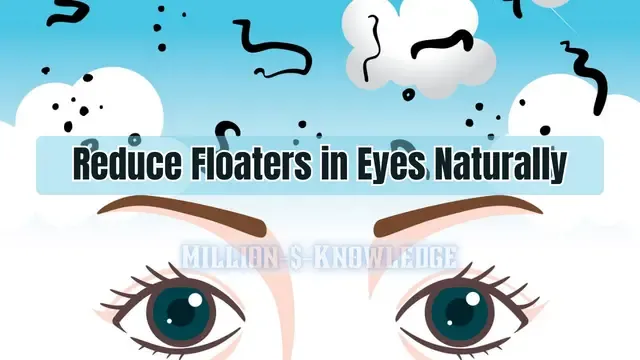How to Reduce Floaters in Eyes Naturally?
Are you tired of those pesky floaters in your eyes that seem to interrupt your vision?
If so, you're in the right place!
In this guide, we will explore effective natural methods to reduce floaters in your eyes.
Whether you're experiencing occasional floaters or they've become a constant annoyance, we've got you covered.
Say goodbye to those distracting specks and read on to discover how you can naturally improve your vision and regain clarity in your sight.
 |
| How to Reduce Floaters in Eyes Naturally? |
📘 Table of Contents:
- Introduction
- What are floaters in the eyes?
- Common causes of eye floaters
- Natural remedies and lifestyle changes
- Conclusion
- FAQs
What are floaters in the eyes?
Floaters are tiny specks, spots, or cobweb-like shapes that float in the field of vision. They can appear as black or gray dots, squiggly lines, or ring-like shapes that drift around with eye movements.
Floaters are actually small clumps of gel or cells inside the vitreous, the clear jelly-like fluid filling the inside of the eye. When these clumps cast a shadow on the retina, they become noticeable as floating objects in the visual field.
Floaters are common and are usually harmless, but if they suddenly increase in number or are accompanied by flashes of light, it may indicate a more serious condition requiring immediate medical attention.
Common causes of eye floaters
Eye floaters can be caused by a variety of physical changes or conditions in the eyes, including:
- Age: As people age, the gel-like substance called vitreous inside the eye may start to liquefy or shrink, leading to the formation of floaters.
- Posterior vitreous detachment (PVD): When the vitreous pulls away from the retina, it can cause floaters as it separates.
- Eye injuries: Trauma to the eye, such as a blow or injury, can result in the appearance of floaters.
- Retinal tear or detachment: If the vitreous pulls too hard on the retina, it may cause a tear or detachment, leading to the presence of floaters.
- Vitreous hemorrhage: Bleeding inside the eye due to conditions like diabetic retinopathy or a retinal tear can cause floaters.
- Eye inflammation: Inflammation in the eye, such as uveitis, can cause the formation of floaters.
- Eye surgeries: Certain eye surgeries, such as cataract removal or vitrectomy, can lead to the development of floaters.
- Near-sightedness (myopia): Individuals with near-sightedness have a higher risk of developing floaters.
- Conditions affecting the vitreous: Certain conditions that affect the consistency or composition of the vitreous humor, such as syphilis or toxoplasmosis, can cause floaters.
- Other eye conditions: Floaters may also be caused by conditions like diabetic retinopathy, macular degeneration, or retinal vascular occlusions.
READ ALSO: 1800 Calorie Meal Plan
Natural remedies and lifestyle changes
- Stay hydrated: Proper hydration can help maintain the health of the eyes and reduce the chances of developing floaters. Drink plenty of water and fluids throughout the day.
- Avoid eye strain: Prolonged periods of staring at screens or reading can strain the eyes and lead to the formation of floaters. Take regular breaks, practice the 20-20-20 rule (look away from screens every 20 minutes at something 20 feet away for 20 seconds), and ensure adequate lighting when reading or using screens.
- Eat a balanced diet: Nutrient-rich foods like leafy greens, fish, fruits, and vegetables can help maintain eye health and potentially reduce the risk of developing floaters. Include foods high in antioxidants and omega-3 fatty acids.
- Manage underlying health conditions: Floaters can sometimes be associated with underlying health conditions like diabetes, high blood pressure, or inflammation. Proper management of such conditions can help reduce the occurrence of floaters.
- Protect your eyes from harmful UV rays: Wear sunglasses that provide 100% UV protection when outdoors to shield your eyes from harmful UV rays, which may contribute to the development of floaters.
- Eye exercises: Regular eye exercises, such as focusing on distant objects or moving the eyes in different directions, may help improve eye health and reduce floaters.
- Reduce stress: Chronic stress can impact eye health. Engage in stress-reducing activities like meditation, deep breathing exercises, or yoga to promote eye health.
NOTE: Remember, these natural remedies and lifestyle changes may not eliminate floaters completely, but they can potentially help reduce their occurrence or improve overall eye health.
Conclusion
There are many effective natural methods that can help reduce floaters in the eyes.
These include:
👉 Maintaining a healthy lifestyle,
👉 Ensuring proper hydration,
👉 Practicing eye relaxation exercises, and
👉 Consuming foods rich in antioxidants and omega-3 fatty acids.
Additionally, it is crucial to avoid activities that strain the eyes and to protect them from harmful UV rays. While these natural remedies may not completely eliminate floaters, incorporating them into one's daily routine can significantly improve eye health and reduce their impact on daily life.
It is always recommended to consult with an eye specialist if floaters persist or worsen.
READ MORE:
★ Health benefits of Bhringraj
★ 18 Best foods to eat when sick
★ How to sleep better at night naturally?
FAQs about Reducing Floaters in Eyes Naturally
Why do eye floaters happen?
Eye floaters occur when small particles of protein float into the jelly-like substance inside the vitreous, the clear, gel-like substance that fills the inside of the eye.
What vitamin is good for eye floaters?
Vitamin C.
Will eye floaters go away on their own?
These do not go away on their own. You need to treat it by eating a healthy diet and doing regular eye exercises.
How to get rid of eye floaters without surgery?
Some tips include maintaining a healthy lifestyle, managing underlying health conditions, using eye exercises, and considering alternative therapies such as laser therapy or vitrification. However, it is important to note that these methods cannot completely remove eye floaters, but can help reduce their visibility or discomfort.





